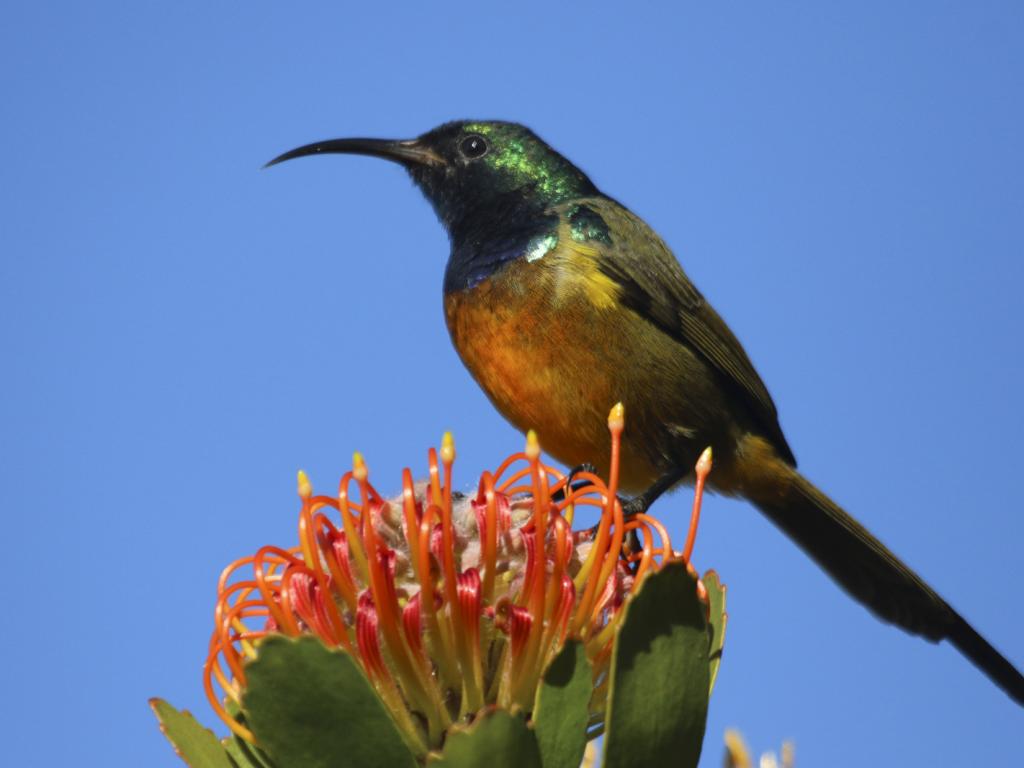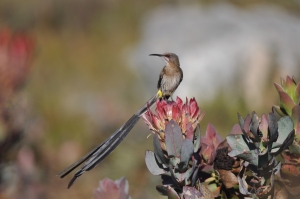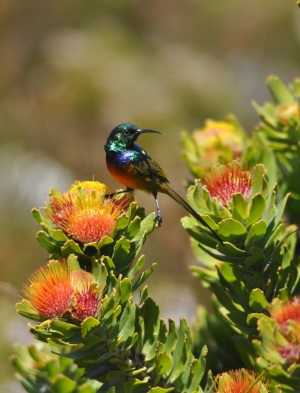Bird declines show that climate change is more than just hot air


The study, published in the Oxford University Press journal Conservation Physiology, suggests that contrary to expectations the birds' heat tolerance - or lack thereof - is not necessarily the main factor causing species to decline. Other factors like changing fire and rainfall patterns, and new bird behaviour patterns could also be responsible, according to the study which includes some well-known species such as the Malachite Sunbird and the Familiar Chat.
Lead researcher Dr Susie Cunningham, Percy Fitzpatrick Institute, at UCT, says a better understanding of how climate change affects bird species could help develop conservation strategies to increase chances of survival; “We know climate change is linked to changes in species’ numbers and distributions, but we don’t always know exactly how or why,” Cunningham says. “We need to figure out the factors actually driving declines before we can develop proper conservation measures to halt them.”
“Fynbos birds are particularly important in this regard because they live in an area that has been extremely stable, climatologically speaking, for a very long time. So changes in climate are not something they are used to. Furthermore, six of the species we studied are endemic to the fynbos, so if we lose them from this biome, we lose them altogether,” she explains.

Orange-breasted Sunbird. Photo Alan Lee
The new study profiles the well-being of twelve fynbos bird species based on a comparison of data contained in two Southern Africa Bird Atlas surveys conducted fifteen years apart. This data was matched with climate data for the comparative period, as well as with physiological data. Bird survey and climate comparisons produced some interesting findings, including:
· All 12 of the study species, which included both endemic and non-endemic fynbos birds, show range declines over the fifteen-year period
· Bird species living in naturally warmer areas are generally faring better than those in cooler areas, but species experiencing greatest warming within their ranges are declining fastest. These patterns are strikingly similar to patterns observed in the Northern Hemisphere, suggesting warm-adapted birds are faring better under climate change, globally.
· Endemic bird species, which typically favour cooler habitats, appear to be more vulnerable to climate change than non-endemic species
· Highest rates of climate warming were recorded in inland (mountainous) areas, whereas some coastal areas have cooled.
· Eight of the 12 study species (and five of six Fynbos endemics) show declines in reporting rate or local extinction in more than half of their habitat range.
A key aspect of the study is a comparison of climate and bird population data with the heat response – or 'thermal tolerance' – of each bird species. In this way researchers assessed to what extent birds can cope with changing temperature, and whether this is the primary indicator of changes in bird abundance.
To obtain bird physiological data researchers subjected birds to a range of temperature tests to determine their physiological response. Considerable variation in the relationship between physiological response to temperature and rate of species’ decline prevented researchers confirming a direct link across the board between how species are faring under current climate change, and their thermal physiology.
Despite this, the study shows 'striking similarity' between bird declines and increases in average temperature, most notably in two bird species occupying cooler rangelands – the Cape Rockjumper and the Protea Seed-eater. Reporting rates of these two species dropped by 31 percent and 32 percent respectively in the study area during the period under review.
In addition the Cape Rockjumper is also the only species whose decline is clearly linked to a low physiological tolerance of heat, prompting the study authors to call for urgent conservation intervention: “Conservation action appears to be urgently needed for the Cape Rockjumper and Protea Seed-eater if their declines are to be properly understood and halted,” the study says. “We need further research to determine the cause of decline of Protea Seed-eaters, and to assess how Cape Rockjumpers may best be assisted to cope in the face of continuing climate change.”
Cunningham says the overall findings suggest scientists should not jump to conclusions about bird physiology when assessing the effects of climate change: “The main findings are that physiology, though often considered the ultimate factor limiting species distributions, may not be the factor responsible for warming-related declines in most Fynbos birds,” she explains.
